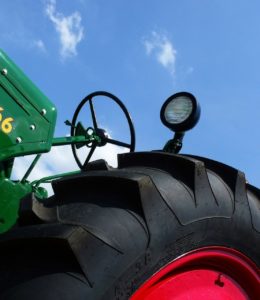Unlike large companies that can afford to replace equipment at regular intervals, homesteaders rely on disciplined maintenance to get the most from their investment. To make a small operation profitable, you’ve got to know how to protect heavy equipment. That means you need to know how to avoid damage and perform upkeep.
Even a minor repair on a heavy tractor can set you back significantly. Follow these tips to steer clear of costly heavy equipment repairs that can leave your operation in the red.
Have a Maintenance Schedule
Heavy equipment endures big loads and exposure to dirt and grime every time you operate it. You should plan to wash, lubricate and check parts on your heavy equipment regularly. For example, in the commercial trucking industry, fleet supervisors perform three different kinds of maintenance services on regular intervals and have a list of items that are checked before and after each job.
Use Equipment Properly and Have Adequate Training
It can be easy to break your equipment if you don’t realize you’re misusing it. Before operating a piece of heavy machinery, you should work with someone who understands how to use the equipment. Or, you can take an instructional course and read the equipment manual.
Pushing equipment past its limits will result in failure, so understand how a given tool or vehicle should or should not be used. Don’t try anything too creative if you want to prolong your equipment life.
Protect Heavy Equipment Electrical Components
Heavy equipment relies on computers to function, but most of the jobs that require heavy equipment don’t occur in places that are friendly to computers. Dust, heat, liquids and other hazards can damage your equipment’s electronics.
As part of your maintenance schedule, make sure to check important connections and electrical components on your equipment regularly. You might catch a dangerous failure before it becomes a safety hazard.

Check Your Tire Pressure and Condition
The tires on your heavy equipment endure severe loads. A tire failure can result in additional damage to your machine. So perform pressure checks and visual examinations of your tires regularly.
If the tires on your vehicle suffer damage, there is a chance you can repair them or pay to have them fixed. When in doubt, always buy new tires. A tire failure at the wrong time can be life-threatening.
Store Your Equipment Safely
Homesteading equipment doesn’t always enjoy the comfort of a dry garage, and that can cause problems. Storing equipment in places that are too cold or hot, too damp or exposed to theft can all compromise your investment.
The last thing you want is for your equipment to waste away when you’re not even using it. Find a dry, cool area that’s out of the sun where you can securely store your equipment when it’s not in use.
Insure Your Equipment
If something should malfunction, wouldn’t it be better to replace it using funds from your insurance than break the bank purchasing a new piece on your own? Making the investment in protective coverage like Ransome’s Physical Damage Program has a variety of benefits.
With a plan to insure your equipment, you can receive funds for rental equipment to ensure your operation remains functional during equipment downtime. In the event of a total loss, coverage programs will pay for the remainder of your loan. That’s worth the cost of premiums by itself.
You can even receive assistance to move your equipment up to 250 miles to a garage that can repair it. It’s easy to see how a policy like this pays for itself.
Keep Thorough Records
With all that you’ve got to keep organized running a homesteading operation, it’s easy to lose track of which equipment needs what maintenance when. That’s why you must maintain exact records for each piece of equipment, and update them religiously as you perform services.
Not only will this remove any doubt about whether a given service is necessary, helping you avoid undue expenses, but it will also preserve the value of the equipment. When it comes time to offload a piece of heavy machinery, you’ll be able to prove it was well cared for.
These seven simple tips might not sound that difficult, and they’re not. They require discipline, but if you can do that, your equipment will last longer and serve you better. In the end, that leads to a more profitable, more successful operation.











1 Comment
I’m glad that you mentioned that heavy equipment must be maintained to avoid costly damage. I know that heavy equipment parts are hard to find, not to mention expensive. Therefore, it’s important to have them maintained. Aside from that, you also need to know where to find replacement parts when you need to repair your heavy equipment parts. This is excellent information that I would relay to my friends and colleagues if ever they need it.